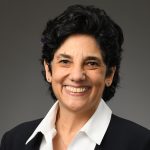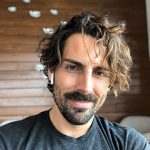Four members of the Fordham Law community share their thoughts and reflections on Pride month, looking at the past, present, and future of civil rights and inclusion for the LGBTQ+ community.
 Past: Reflection from Professor Joseph Landau
Past: Reflection from Professor Joseph Landau
I first visited Fordham Law in 2003, the year Lawrence vs. Texas was decided, to speak at the annual Lavender Law conference about my work representing transgender individuals navigating the U.S. asylum process. I joined the faculty in 2010, the year California’s Proposition 8 was struck down in federal district court.
As I reflect on Pride month, six years post-Obergefell and almost exactly a year post-Bostock, I’m struck not only by the progress our community has made in what is (in the grand scheme of things) the relatively brief time since my first visit to Fordham, but also by my great fortune to work alongside our wonderfully dedicated and talented community of students, faculty, administrators, and staff. Fordham is a unique and special place, and I am perpetually inspired by the conviction of our LGBTQ+ community to make Fordham and the world around us more welcoming and more just. Through my involvement with OUTLaws, I’ve seen our students and alumni forge alliances across the institution, helping to energize and lift other groups to new levels of accomplishment.
As I reflect on the work we’ve accomplished and the challenges ahead, I’m heartened to be a part of such a vital and vibrant Institution, and to work alongside so many gifted students and colleagues pursuing innumerable paths in the law, and who remain united by a shared sense of kindness, courage, and compassion.
 Past and Present: Reflection from Professor Elizabeth Cooper
Past and Present: Reflection from Professor Elizabeth Cooper
I am so proud of how far Fordham Law has come in the last 25 years. When I first arrived at the Law School in 1995, GALLA (the name of the LGBTQ+ student group at the time) typically met off-campus to protect the identities of its members. I knew some of my faculty colleagues were gay, but most were not out. Fordham Law, like society more generally, was not a very comfortable place to live and love openly.
Although change never comes quickly enough, Fordham Law is now a welcoming place for all members of the LGBTQ+ community. OUTLaws meets openly and proudly at the Law School. There are five out lesbian and gay faculty members and many administrative and support staff are out members of the LGBTQ+ community. We are recognized by the students, faculty, administration, and alumni for all that we bring to the table, including our LGBTQ+ identities. No institution is perfect, but Fordham Law is committed to creating an environment in which we all matter, where we can always bring our full selves to the table.
 Present: Reflection from Professor Bennett Capers
Present: Reflection from Professor Bennett Capers
When I joined Fordham in 2020, it felt like coming home. This is because my first experience at Fordham was in 2008 when I was a visiting professor here.
Even then, there was already a vibrant community of LGBTQ+ professors, including several LGBTQ+ faculty of color. It speaks volumes that Joe Landau is now the second gay vice-dean in the last twelve years, and that last year the school established the Deborah A. Batts scholarship, named in honor of the country’s first openly gay federal judge, a Black woman who started her career as a Fordham Law professor. Another reason joining Fordham felt like coming home: Judge Batts was a mentor to me back when I was a federal prosecutor trying cases before her. I’m especially proud the Deborah A. Batts scholarship is associated with the Center on Race, Law, and Justice.
There is one more thing to say about Fordham as home. Home is a place you take ownership of. You’re always trying to make it better, and fix whatever is broken or outdated. For example, when I visited Fordham in 2008 (years before marriage equality), the LGBTQ+ faculty were fighting to have the university recognize domestic partners. The faculty won that fight. There is something amazing about being at a school that is committed to growing, changing, evolving, and doesn’t mind a bit of “good trouble” now and again to improve things.
Future: Reflection from William Lanier ’23 
Advocating for inclusion and diversity is at the core of everything I do, and commitment to fostering a diverse student body was the leading factor when deciding where to attend law school.
Schools frequently ask for a personal essay highlighting what makes you diverse. This forces many of us to bare our souls, rehash old traumas, and lay it all on the line to prove our resilience in hopes of an offer of admission.
I toured Fordham the day the school shut down due to the pandemic. As I was walking the empty halls with Kate Cunningham, she asked about my childhood growing up gay in a small Texas town. She had read my essay, and I felt seen and heard. I knew right then Fordham would be my home for the next three years.
As our nation mourned the murder of George Floyd, diversity and inclusion became mainstream. Not knowing all the answers but knowing these issues needed to be addressed in the nation’s law schools, Fordham facilitated conversations, allowed themselves to be vulnerable, listened to students, and showed their commitment to making diversity and inclusion a core value.
As a leader with OUTLaws and a Law Student Board Member of the National LGBT Bar, I am committed to working with Fordham on their advocacy for LGBTQ+ students, elevating our voices, and sharing our successes so we may succeed in our time within these halls, and take what we’ve learned here to help advance equity and inclusion wherever our journeys take us.



